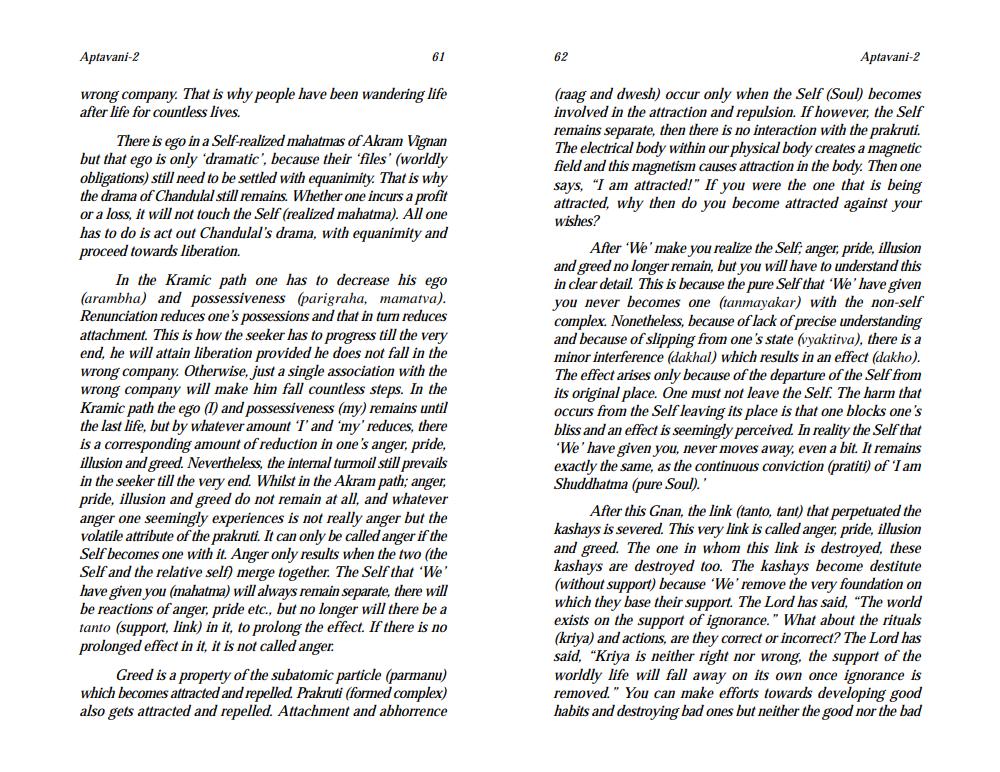________________
Aptavani-2
wrong company. That is why people have been wandering life after life for countless lives.
61
There is ego in a Self-realized mahatmas of Akram Vignan but that ego is only 'dramatic', because their 'files' (worldly obligations) still need to be settled with equanimity. That is why the drama of Chandulal still remains. Whether one incurs a profit or a loss, it will not touch the Self (realized mahatma). All one has to do is act out Chandulal's drama, with equanimity and proceed towards liberation.
In the Kramic path one has to decrease his ego (arambha) and possessiveness (parigraha, mamatva). Renunciation reduces one's possessions and that in turn reduces attachment. This is how the seeker has to progress till the very end, he will attain liberation provided he does not fall in the wrong company. Otherwise, just a single association with the wrong company will make him fall countless steps. In the Kramic path the ego (1) and possessiveness (my) remains until the last life, but by whatever amount 'T' and 'my' reduces, there is a corresponding amount of reduction in one's anger, pride, illusion and greed. Nevertheless, the internal turmoil still prevails in the seeker till the very end. Whilst in the Akram path; anger, pride, illusion and greed do not remain at all, and whatever anger one seemingly experiences is not really anger but the volatile attribute of the prakruti. It can only be called anger if the Self becomes one with it. Anger only results when the two (the Self and the relative self) merge together. The Self that 'We' have given you (mahatma) will always remain separate, there will be reactions of anger, pride etc., but no longer will there be a tanto (support, link) in it, to prolong the effect. If there is no prolonged effect in it, it is not called anger.
Greed is a property of the subatomic particle (parmanu) which becomes attracted and repelled. Prakruti (formed complex) also gets attracted and repelled. Attachment and abhorrence
Aptavani-2
(raag and dwesh) occur only when the Self (Soul) becomes involved in the attraction and repulsion. If however, the Self remains separate, then there is no interaction with the prakruti. The electrical body within our physical body creates a magnetic field and this magnetism causes attraction in the body. Then one says, "I am attracted!" If you were the one that is being attracted, why then do you become attracted against your wishes?
62
After 'We' make you realize the Self, anger, pride, illusion and greed no longer remain, but you will have to understand this in clear detail. This is because the pure Self that 'We' have given you never becomes one (tanmayakar) with the non-self complex. Nonetheless, because of lack of precise understanding and because of slipping from one's state (vyaktitva), there is a minor interference (dakhal) which results in an effect (dakho). The effect arises only because of the departure of the Self from its original place. One must not leave the Self. The harm that occurs from the Self leaving its place is that one blocks one's bliss and an effect is seemingly perceived. In reality the Self that 'We' have given you, never moves away, even a bit. It remains exactly the same, as the continuous conviction (pratiti) of 'I am Shuddhatma (pure Soul).'
After this Gnan, the link (tanto, tant) that perpetuated the kashays is severed. This very link is called anger, pride, illusion and greed. The one in whom this link is destroyed, these kashays are destroyed too. The kashays become destitute (without support) because 'We' remove the very foundation on which they base their support. The Lord has said, "The world exists on the support of ignorance." What about the rituals (kriya) and actions, are they correct or incorrect? The Lord has said, "Kriya is neither right nor wrong, the support of the worldly life will fall away on its own once ignorance is removed." You can make efforts towards developing good habits and destroying bad ones but neither the good nor the bad




